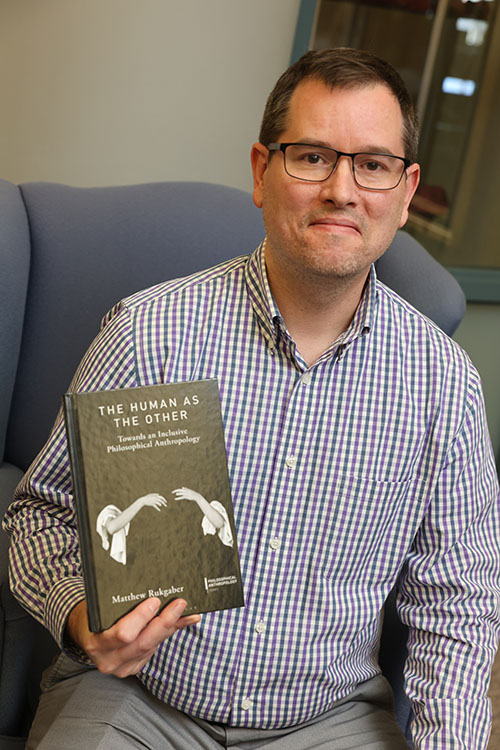- Apply
- Visit
- Request Info
- Give
Rukgaber's new book reimagines bygone philosophical movement
'The Human as the Other' revisits philosophical anthropolgy
Written by Elisabeth Craig
Published on February 28, 2025
 Philosophy Professor Matthew Rukgaber of Eastern Connecticut State University recently published a book examining an early 20th-century philosophical movement that blended with science to analyze aspects of humanity. “The Human as the Other” was published Jan. 23 through Bloomsbury Publishing.
Philosophy Professor Matthew Rukgaber of Eastern Connecticut State University recently published a book examining an early 20th-century philosophical movement that blended with science to analyze aspects of humanity. “The Human as the Other” was published Jan. 23 through Bloomsbury Publishing.
According to Rukgaber, the book’s topic, known as philosophical anthropology, was an attempt by European thinkers to understand what it means to be human.
“It’s a movement in philosophy that started in the 1920s and stopped being active in the 1970s, so there was a short period where people were invested in it,” he said.
“It looks at biology, human evolution and the development of human society and civilization, but it also tries to then explain more philosophically our capacities in what makes us human.”
Rukgaber explained that the movement’s popularity dwindled during the 1970s, when social movements in the West essentially took its place.
“In the 1970s, you get a lot of philosophical movements that are very critical of that approach, like feminism and postmodernism, which had more ‘critical theory’ approaches to philosophy,” he said.
“These movements, along with existentialism, decided that human beings didn't have a nature and that in a way we were sort of free and socially determined. Thus, biological explanations of the human just fell out of favor.”
According to Rukgaber, when the movement was first proposed, it fit in amongst German thinkers as well as some French thinkers. However, European philosophy started moving toward more progressive thought, which led to its decline in popularity.
“Now, European philosophy has steadily moved away from connections to science,” said Rukgaber. “Everything is being analyzed in terms of political and social relations, so philosophical anthropology’s attempt to think about the human in physical and biological terms doesn’t really fit in with a lot of stuff going on in European philosophy.”
In his book, Rukgaber argues that humans are biologically wired to be uniquely dependent on social institutions and norms for cues on how to conduct themselves. He cites German philosopher Arnold Gehlen and his theories about how humans don’t have primal “instincts” to guide them, differentiating them from animals.
"Gehlen tells a natural history of how we have evolved to be wholly dependent on social institutions to inform us how to walk, talk, eat, etc.,” he said. "Everything we are, including our most fundamental emotions and impulses, is socially informed.”
He continued: “The people who rejected this movement didn't want to look at the biology; they wanted to just focus on society and politics. What they don't understand is that our biology makes it so that we have to be wholly dependent on other people and institutions and transmission of language by social means and other people teaching us how to do everything.”
Rukgaber explained that philosophical anthropology is also inclusive; the theory validates people who may not have the cognitive ability to adapt readily to societal conventions. A lot of the ways humans relate to each other, such as reflecting each other’s behaviors, is beneath the conscious levels of cognition.
“A big motivation for my book is to say that some people who are clearly humans don't necessarily have the same level of rationality or comprehension, such as children or those with a severe intellectual disability, and yet they’re still humans because they have that social dependence,” he said.
He continued: “But also, we are internally connected to others and able to understand others at the level of feeling in the body so that regardless of your cognitive skills, we're still interacting as humans.”
To promote his new book, Rukgaber will present at the Dimensions of Difference Symposium, a conference that centers around scholarly perspectives on the diversity of the human experience. "I'll be presenting at the conference at Beacon College in Florida, an institution that caters to a student population with learning disabilities," said Rukgaber.


